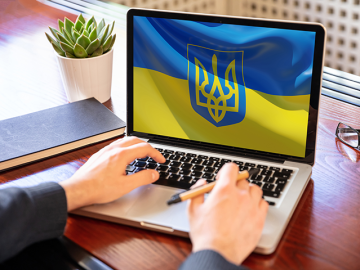The EU’s rapid activation of the EU Temporary Protection Directive allowed people fleeing the conflict to quickly settle and find work across the EU. But as the ‘Barriers to employment of displaced Ukrainians’ paper shows, finding lasting work remains challenging for many.
The paper explores in depth the labour market barriers that people fleeing the ongoing war in Ukraine experience. It calls for specific, tailored and targeted support to allow people better integrate and work. This includes offering language training since 63% of jobseekers lack the language skills to find work in their host country. As 28% do not work because they need to care for children, or elderly/sick relatives, improving access to childcare, especially early childhood education is crucial. This applies particularly to women who are the largest share of people who fled Ukraine.
Accelerating the procedures for recognising qualifications or allowing employers to evaluate skills without documentation could also help, as up to 18% of jobseekers say that the qualification was not recognised.
Government should also provide adequate checks and balances to prevent mistreatment at work. This is vital as 23% could only find irregular work and up to 25% report difficulties like working very long hours or being underpaid.
“The EU stands in solidarity with Ukraine, a solidarity that is unwavering and not only manifest in political, humanitarian, financial and military support to the country, but also the everyday support and assistance that EU citizens provide to Ukrainians fleeing the war,” says Eurofound Executive Director Ivailo Kalfin. “As the war is becoming protracted and when the displaced Ukrainians will be able to return home remains uncertain, integration measures, including labour market inclusion, have come to the fore – and should continue to do so to alleviate the lives of the displaced persons.”
“Access to employment is a basic right but real life challenges prevent people who fled the war from working and supporting themselves and their family,” says FRA Director Michael O’Flaherty. “This timely paper examines the everyday difficulties many face and suggests how policymakers can improve the lives of those who have already suffered so much.”
The paper draws on survey findings carried out by FRA. The survey ran from August to September 2022 in Bulgaria, Czechia, Estonia, Germany, Hungary, Italy, Poland, Romania, Slovakia and Spain.
More information
- Report ‘Barriers to employment of displaced Ukrainians’
- Eurofound topic page: Stand with Ukraine
- FRA topic page: Fundamental rights and the Russian war of aggression against Ukraine
- Eurofound Ukraine country profile
- Eurofound EU PolicyWatch
Contact
- Tereza Reznakova, Press and media officer, FRA, media@fra.europa.eu / Tel.: +43 1 580 30 653
- Måns Mårtensson, Senior Communication Manager, Eurofound, mma@eurofound.europa.eu, +353-876-593507
